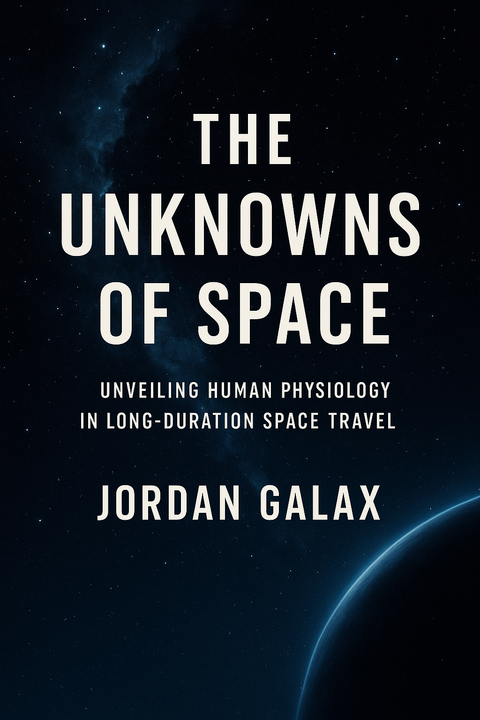
The Unknowns of Space
Exploring the Effects of Long-Duration Space Missions on Human Body and Health
Included:
✓ 200+ Page AI-Generated Book
✓ ePub eBook File — read on Kindle & Apple Books
✓ PDF Print File (Easy Printing)
✓ Word DOCX File (Easy Editing)
✓ Hi-Res Print-Ready Book Cover (No Logo Watermark)
✓ Full Commercial Use Rights — keep 100% of royalties
✓ Publish under your own Author Name
✓ Sell on Amazon KDP, IngramSpark, Lulu, Blurb & Gumroad to millions of readers worldwide
Introduction to Space's Impact
Exploring the cosmos has sparked the imagination of humans for generations, but what are the realities of long-duration space travel on our bodies?
This book delves into the scientific findings regarding the diverse effects of extended missions beyond Earth.
Musculoskeletal Challenges in Microgravity
The absence of gravity takes a significant toll on our muscular and skeletal systems. Astronauts can lose up to 1–1.5% of their bone density each month while in space.
This chapter provides an in-depth look at the mechanisms behind muscle atrophy and bone density loss, as well as the consequences that astronauts face post-mission.
Cardiovascular System Under Siege
The cardiovascular system undergoes a complex transformation during space travel. Fluid redistribution and altered plasma volume can lead to orthostatic intolerance and decreased exercise capabilities.
Find out how space travel challenges heart health and what solutions are being developed to mitigate these effects.
Neurocognitive Adaptations
Our brain's functions are profoundly impacted during long voyages in space. This section covers the neuroplastic changes that occur and how lessened executive function and spatial disorientation can affect an astronaut's performance.
We will also analyze the sensory changes that compromise motor control and balance.
Understanding Immune System Changes
Space travel leads to an unpredictable immune response, making astronauts more susceptible to infections.
This chapter discusses how alterations in cytokines and immune responses are being studied to ensure the health of astronauts during long missions.
Underlying Effects and Countermeasures
The consequences of long space missions also include sleep disturbances, psychological challenges, and potential hormonal changes.
This book highlights the ongoing research that combines various fields of study—physiology, neuroscience, and molecular biology—to develop effective countermeasures.
Conclusion: Future of Human Space Exploration
As humanity sets its sights on Mars and beyond, understanding the physiological challenges of long-duration space travel is essential.
With this knowledge, we can prepare for healthier missions in the cosmos.
Table of Contents
1. Understanding the Human Body in Space- Introduction to Space Physiology
- The Role of Gravity
- Defining Longevity in Space Missions
2. Musculoskeletal Effects of Space Travel
- Skeletal Degradation Mechanics
- Combating Muscle Atrophy—Exercise and Nutrition
- Post-Mission Rehabilitation Strategies
3. Cardiovascular Challenges in Microgravity
- Fluid Redistribution During Space Missions
- Orthostatic Intolerance— A Common Challenge
- Technological Solutions for Heart Health
4. Neurocognitive Changes in Astronauts
- Understanding Neuroplasticity in Space
- Cognitive Performance Challenges
- Sensory Disorientation Risks
5. Immune System Function in Space
- Altered Cytokine Profiles
- Infection Risks for Astronauts
- Researching Immunological Countermeasures
6. Psychological Effects of Isolation
- Mental Health During Long Missions
- Understanding Isolation Effects on Behavior
- Support Strategies for Astronauts
7. Sleep and Hormonal Changes in Space
- Patterns of Sleep Deprivation
- Hormonal Disruption Causes
- Mitigative Technologies and Techniques
8. Vision and Balance Challenges
- Effects of Microgravity on Vision
- Balancing Postural Stability in Space
- Adaptations to Sensory Changes
9. Radiation Risks in Deep Space Missions
- Understanding Space Radiation Effects
- Cancer Risk During Long Missions
- Protective Technologies Under Development
10. Countermeasures Against Physiological Impacts
- Exercise Protocols for Astronauts
- Pharmacological Aids and Innovations
- Technological Developments to Protect Health
11. Case Studies of Previous Missions
- Apollo Missions Insights
- International Space Station Discoveries
- Lessons from Mars Missions
12. The Future of Long-Term Space Exploration
- Preparing for Missions to Mars
- Long-Term Health Monitoring Strategies
- The Path Forward in Space Health Research
Target Audience
This book is written for space enthusiasts, researchers, medical professionals, and anyone interested in the physiological challenges of human space exploration.
Key Takeaways
- Comprehensive understanding of the physiological effects of long-duration space travel.
- Insights into current research and countermeasures for health risks faced by astronauts.
- Knowledge on the interconnectedness of various health systems impacted by microgravity.
- Strategies to prepare mentally and physically for long missions in space.
- Future implications for human health in upcoming explorations to Mars and beyond.
